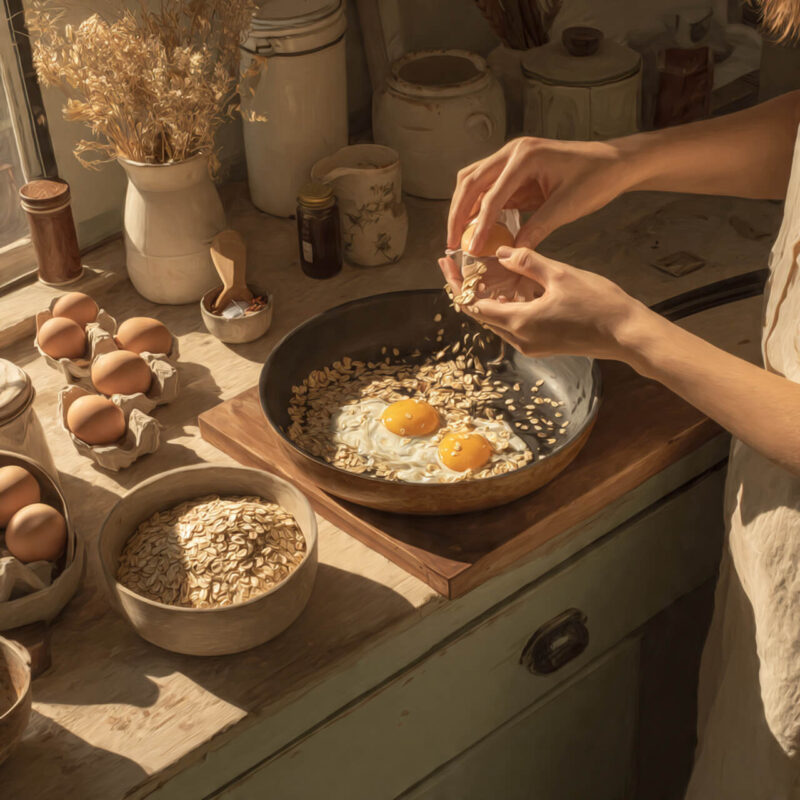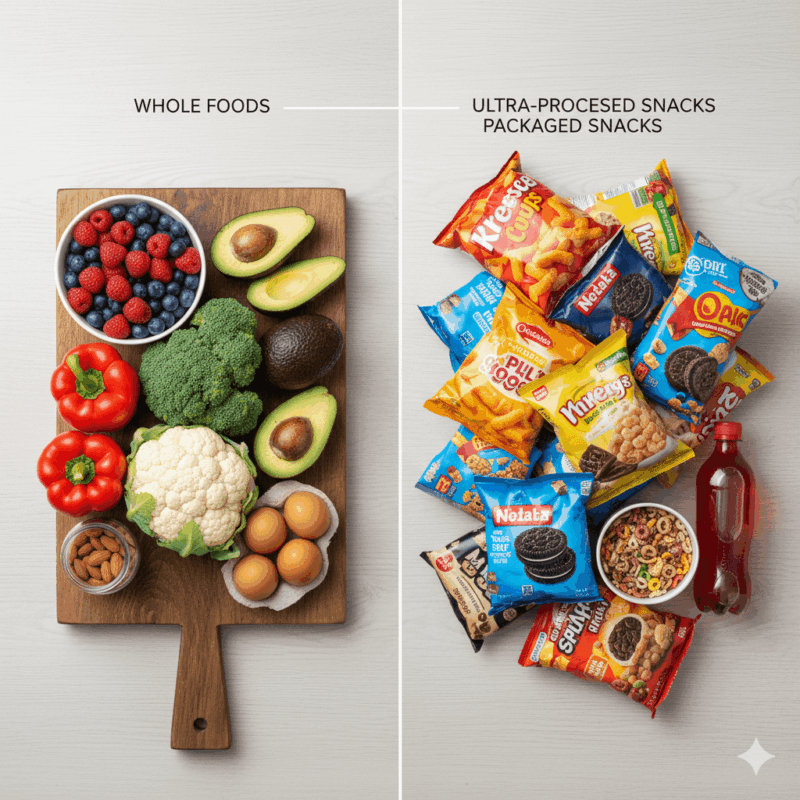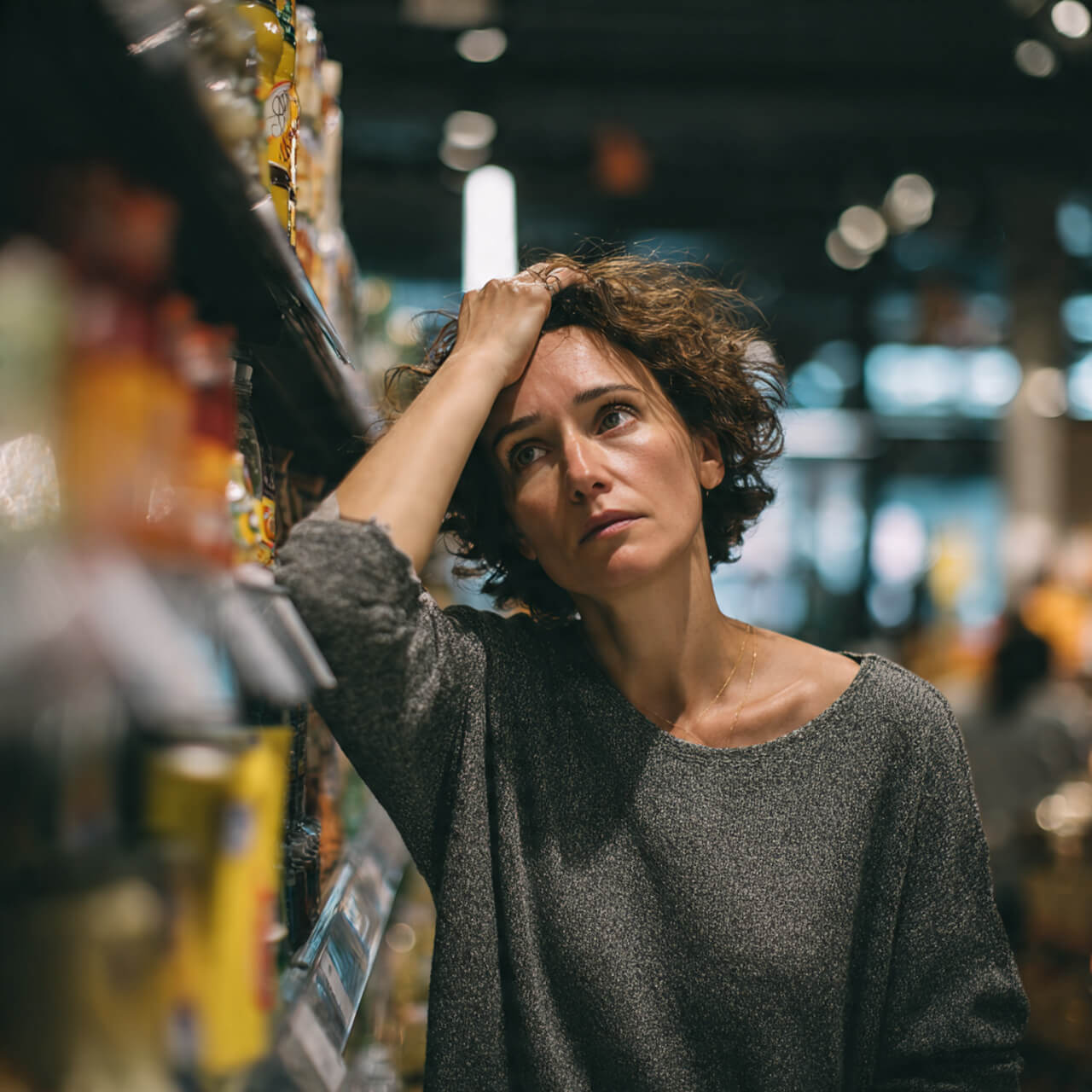Read time: 13 minutes
Let me guess: you’ve demolished a share bag of crisps while scrolling through your phone and can’t remember tasting a single one. Or maybe you’ve microwaved a ready meal, eaten it standing at the counter, and felt bloated and rubbish afterward but couldn’t quite explain why. Chances are, ultra-processed foods are playing a bigger role than you think. You know you should eat better, but the gap between knowing and doing feels massive.
I get it. That was me too.
Within months of switching to whole foods and mindful eating, I lost 4.5 stone, stopped chronic bloating and brain fog, and avoided gallbladder surgery—all without counting calories or following restrictive diet rules.
Changing how you eat isn’t really about food. It’s about the relationship you have with eating itself—the autopilot mode most of us live in. When food becomes background noise, it’s easy to fill your body with stuff that makes you feel terrible.
The good news: you don’t need a total life overhaul, a strict diet plan, or superhuman willpower. You just need to start eating with intention. And that begins with understanding what you’re actually putting in your body.
The funny thing is, most of us already know when food makes us feel off we just stop noticing. That’s where the real work starts: paying attention again.

Quick Summary:
Feeling bloated, foggy, and low on energy? This guide shows how simple swaps from ultra-processed foods to real, whole foods can transform your energy, digestion, and focus—without calorie counting or restriction.
Disclaimer: I’m not a nutritionist, dietician, or doctor. I’m just someone who figured out what worked for my body through trial, error, and paying attention. This is my experience, not medical advice. If you’ve got specific health conditions, talk with a professional. But if you’re simply tired of feeling rubbish and want practical starting points? Keep reading.

Why Are Ultra-Processed Foods Harmful?
Ultra-processed foods, or UPFs are factory-made foods with long ingredient lists full of things you’d never find in a home kitchen: emulsifiers, stabilizers, artificial flavours, and modified starches. If you can’t pronounce it and wouldn’t cook with it, it’s probably a UPF.
A 2025 review of over 8 million adults found that every extra 100g per day of UPFs was linked to higher risks of high blood pressure, digestive issues, heart disease, and cancer. In a 2019 experiment (Hall et al., Cell Metabolism), people eating ultra-processed diets consumed 500 more calories per day and gained 2 pounds in two weeks—while those eating real food lost 2 pounds, even though both groups had the same nutrients.
Researchers noticed participants ate UPFs faster, which triggers reward centres in the brain. These products aren’t really food in the way your body understands food. They’re engineered to be hyper-palatable and addictive—which is why you can’t stop at one.
According to the [NHS Eatwell Guide and the British Nutrition Foundation](https://www.nhs.uk/live-well/eat-well/food-guidelines-and-food-labels/the-eatwell-guide/), the base of a healthy diet is built on simple, minimally processed foods—fruits, vegetables, whole grains, and lean proteins—because they nourish the body without overwhelming it with additives or hidden sugars.
As Dr. Tim Spector, Professor of Genetic Epidemiology at King’s College London, explains:
“Your gut bacteria thrive on real food — and the more variety you eat, the healthier your microbiome becomes.”
(Source: Tim Spector, The Diet Myth, 2021)
What Changes When You Switch to Whole Foods from ultra-processed foods?
When I stopped eating ultra-processed foods and started eating real food, things that came from the ground or an animal, not a lab,everything changed.
My taste buds recalibrated. Ready meals I used to think were fine now taste artificial. Crisps? Too chemical. My body remembered what real food tastes like and started rejecting imitations.
Bread was my weakness. Still is. But I’ve learned to be smart about it. I eat more sourdough now because it’s easier on the gut. The fermentation process breaks down some of the compounds that cause digestive issues. In simple terms, sourdough raises blood sugar more slowly and is easier to digest than regular bread.
Knowing why helps, but feeling the difference seals it. Once you notice how good real food makes you feel, you naturally want more of it

How Do I Start Eating Better Tomorrow?
Step 1: Start Your Day With Intention
Eat breakfast without distractions. Sit, taste, and notice how food makes you feel. Studies show mindful eating improves diet quality and reduces overeating.
Step 2: Read the Bloody Labels
If it has more than five ingredients, or ones you can’t pronounce, it’s likely ultra-processed. I mean have you seen the ingredient’s in a pack of cheap ham? that is ultra-processed foods
Step 3: Create Your Pause
Before you eat, ask: “Do I actually want this? Will I enjoy it enough to be worth how I’ll feel after?”
That question is everything.
Step 4: Make One Swap This Week
| Instead of This | Try This |
|---|---|
| Supermarket sliced white bread | Sourdough from a local bakery |
| Bottled salad dressing | Olive oil, lemon juice, salt, pepper |
| Ready meals | Batch-cooked real food |
| Packaged snacks | Nuts, fruit, homemade trail mix |
| Sugary breakfast cereal | Plain oats with fruit and nuts |
Step 5: Pay Attention to How You Feel
Your body gives constant feedback. Learn to listen.
These small daily swaps add up — and if you want a simple way to track them, try the Everyday Mastery Habit Tracker.
But information alone doesn’t change habits. The real battle usually happens in your head, that quiet conversation between logic and craving.
If you’re wondering what practical steps actually look like in real life, check out 7 Tiny Food Swaps That Quietly Transform Your Energy
Meet Mr. Critic — Your Misdirected Protector
Mr. Critic is the part of you that loves to comment on every choice you make. With food, he’s especially loud. He started out with good intentions, to keep you safe and help you fit in, but somewhere along the way, his methods turned unhelpful.
He doesn’t need to be your enemy at all he just needs a new job. Instead of berating you (“You’re weak for eating that”), he can learn to ask better questions (“Do you actually want this? Will it make you feel good?”). This isn’t about silencing him—it’s about retraining him.
That pause—that conscious moment—changes everything. It turns food choices from automatic to intentional.
For some people, Mr. Critic shows up as a voice. For others, he’s more of a feeling—tightness in the chest, a wave of guilt, or that heavy sense of “I’ve blown it.” However he appears, the pattern is the same: he convinces you that because you slipped once, you might as well give up.
In my case, he’d whisper things like, “You’ve already messed up, so you might as well finish the bag. You can start again next week.”
If this resonates check out how to calm your inner critic

Mr Crtic Moment
“You’ve already blown it today — might as well finish the bag.”
3 Actions You Can Take Today to reduce ultra-processed foods
- Swap one ultra-processed food you eat daily for a whole-food version.
- Sit down for your next meal without your phone and notice the difference.
- Read one food label this week and count how many ingredients you can’t pronounce.
Everyday Mastery Steps You Can Take Now
You don’t need to overhaul your diet overnight. These are small, realistic shifts that make a big difference.
- Notice your patterns. Observe what and how you eat for two days. Awareness beats guilt every time.
- Create your pause. Before grabbing something packaged, take a breath and ask, “Do I actually want this?” That micro-pause builds self-trust.
- Reframe progress. A single swap or mindful meal is progress. The goal isn’t perfection—it’s paying attention.
If you’re curious how small habits build real change, explore How to build habits that actually stick

Journalling Prompts:
When do I tend to eat on autopilot—and what’s really driving it?
Which foods genuinely make me feel good after eating?
How can I create more “pause moments” before I eat this week?
FAQ — Common Questions About Eating Real Food
1. What’s the easiest way to cut down on ultra-processed foods?
Start with one meal—like breakfast. Swap cereal for eggs or oats. Once that feels normal, change another meal.
2. Can I still eat out and stay healthy?
Absolutely. Focus on real ingredients—grilled meat, vegetables, and sides you recognise. Skip endless sauces or fillers.
3. What if my family isn’t on board?
Start with small shared changes—like switching cooking oil or bread. People often come around when they feel the difference.
4. Does it matter if I can’t afford organic?
Not at all. The biggest win is reducing ultra-processed foods, not buying expensive alternatives. Frozen vegetables and tinned beans count as real food.
5. How long until I notice results?
Most people notice less bloating and more energy within two weeks. Brain fog and cravings usually ease after a month.
At the end of the day, your body knows what real food is. It’s been trying to tell you for ages.
The more you listen, the easier it becomes. The cravings quiet down, your energy returns, and you stop fighting yourself. It’s not a diet — it’s a conversation with your body that finally starts to make sense.
Maybe it’s time to start listening.
The shift doesn’t happen overnight, but it does happen. Each mindful choice tells your body, “I’m paying attention now,” and that changes everything
For a step-by-step system that uses the same approach, read 5 Simple Ways to Achieve Weight Loss Without Willpower.
And that’s the heart of Everyday Mastery — small, honest changes that add up to lasting strength.
And if motivation keeps fading just when you’re making progress, read Why Motivation Fails (and What to Do Instead).
If you enjoyed this post, you can get new ones like it straight to your inbox.
👉 Join the Everyday Mastery newsletter — simple habits, real stories, and calm progress, every week.
If you’d like to support the writing, you can buy me a coffee — it keeps the kettle (and the ideas) warm.
Kel is the writer behind Everyday Mastery, where she shares the real, messy, and meaningful process of building habits, resilience, and self-belief from the ground up. Her writing blends ancient philosophy with modern science, always focused on small, practical steps that lead to lasting





